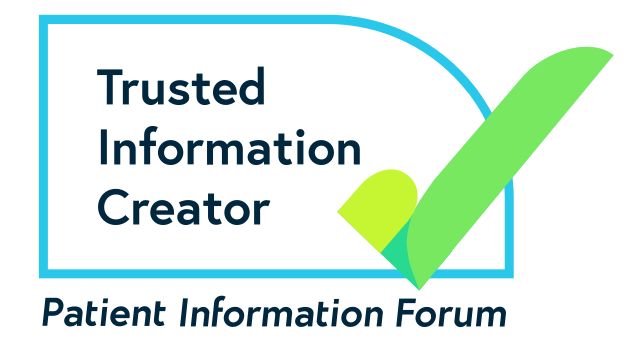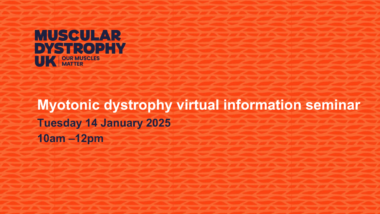Our condition-specific alert cards provide crucial information for emergency healthcare professionals treating patients with muscle wasting conditions.
Myotonic dystrophy type 1 (DM1)
Myotonic dystrophy type 1 (DM1) is a genetic condition that typically affects the skeletal muscles, which are used for movement. DM1 also affects other bodily functions including the heart, lungs, and gastrointestinal system.
There are two main types of myotonic dystrophy. Myotonic dystrophy type 1 (DM1), which tends to be more severe and common in the UK, and DM2. For more information on DM2, see our DM2 page.
DM1 is a multisystemic condition, meaning it affects multiple parts of the body. It is characterised by progressive muscle weakness and wasting. DM1 can be categorised into subtypes based on when the symptoms start, including congenital, childhood, adult, and late onset. Each type has different symptoms, severity, and progression.
Myotonic dystrophy type 1 (DM1) can affect people in several ways. The age when symptoms start can vary from birth to old age. In general, the later the condition starts, the milder it’s expected to be.
Skeletal muscles
DM1 leads to two main muscle problems. The first is a gradual weakening of specific muscles over time. Weakness can often start in the muscles in the face, eyelids, jaw, and neck. Facial weakness means it may be hard to make typical facial expressions, speak, or chew. Early on, weakness may also affect the forearms that help us to grip objects. Muscles around the ankles may weaken and make it difficult to lift the foot and toes and will affect walking. This is known as ‘foot drop’ and increases the risk of trips and falls. The large weight-bearing muscles of the legs and thighs are usually affected much later. Muscle weakness progression is slow and varies from person to person. It can affect walking, standing from a seated position, and using stairs. Some people may only have mild muscle weakness, while others may need orthotics, walking aids, or a wheelchair in more severe cases.
The second main muscle problem is myotonia, which causes muscle stiffness and makes it difficult to relax muscles. This mostly affects the hands and jaw. Myotonia can usually be improved by activating and repeatedly using the muscles, a process called the ‘warm up phenomenon’. Myotonia can also be managed with medication if needed.
Cardiac
DM1 often affects the heart’s electrical system, which can significantly impact health and cause life-threatening problems. This can lead to arrhythmias (irregular heartbeats) such as bradycardia (slow heart rate), heart block, atrial fibrillation, and ventricular tachycardia. Symptoms can include dizziness, chest pain, trouble breathing, and fainting. Heart problems can begin even when muscle weakness is mild, and some people may not have noticeable symptoms when they start. Regular heart check-ups are important to identify cardiac issues early and manage them with treatment. Venous thromboembolism, the formation of blood clots within veins, is increasingly recognised as a potentially life-threatening complication of DM1. Doctors need to consider this when cardiac symptoms happen.
Respiratory
Weakness and stiffness in the muscles that helps with breathing can affect respiratory function and make it harder to breathe effectively. This can cause daytime sleepiness and increase the risk of chest infections, especially after general anaesthesia or chest infections. Swallowing difficulties can also lead to aspiration, where food or liquid enters the lungs, increasing the risk of aspiration pneumonia, a serious lung infection. Chest infections are common and should be treated quickly. Some people with DM1 may also experience obstructive sleep apnoea, where the airway gets blocked during sleep, making breathing difficult.
Speech and swallowing
Weakness in the muscles of the head and neck can make speech unclear. Speech may sound slurred or slow, and it may be tiring to speak for long periods of time.
Swallowing difficulties (dysphagia) are common but often go unnoticed. These issues can lead to coughing and choking when eating or drinking, the feeling of food sticking in the throat, and unplanned weight loss. It may be difficult to take in enough nutrition. Swallowing difficulties can cause frequent chest infections and aspiration pneumonia, a serious lung infection, which needs to be treated quickly.
Gastrointestinal
Gastrointestinal symptoms are common in DM1 and can range from mild issues like indigestion to more severe bowel problems. Many people with DM1 experience slow digestion, which can cause bloating and discomfort. There is often a reduced ability for the digestive tract to move food efficiently, causing symptoms like bloating and abdominal pain. These symptoms are often similar to irritable bowel syndrome (IBS), and constipation and diarrhoea are common.
Eyes
People with DM1 often develop cataracts (clouding of the lens in the eye) before the age of 50. They develop slowly and may not cause noticeable symptoms such as blurry vision until they get worse. Early onset cataracts can be effectively treated. Some people may have a history of cataracts at an early age and then develop muscle symptoms later in life. Other eye problems include squints, droopy eyelids (ptosis) and difficulty fully closing the eyelids, which can lead to dry eyes. Changes in the retina (the light-sensitive layer at the back of the eye) and changes in eye pressure can also occur. Annual eye tests are recommended to detect and manage these conditions.
Cognition
DM1 can affect the brain in various ways, leading to cognitive and neurological challenges. Many people with DM1 experience mild cognitive and neurological challenges such as difficulty with concentration, memory, decision-making, organisation, and planning. This is often more severe in cases of congenital or childhood-onset DM1 and can impact their level of independence.
As adults with DM1 age, they may also experience cognitive decline. Some people might notice changes in their personality, such as increased apathy and becoming more withdrawn, or experience mental health issues like depression. Mental health services can provide advice on the best therapy, if needed. Regular physical exercise is also encouraged.
Sleep problems are common and can cause excessive daytime sleepiness (EDS), where staying awake during the day becomes difficult. EDS can be managed with medications if needed, following a heart and lung health check. This may be linked to changes in the brain areas that control sleep and breathing.
Genetic changes
DM1 is caused by a change in the DMPK gene, which is found on chromosome 19. This change leads to an abnormal increase in a repeated section of genetic code, known as CTG repeats.
In people without DM1, this CTG sequence is repeated between 5 to 34 times. In a person with DM1, the number of repeats is much higher.
When the CTG repeats get too high, it disrupts how the cells work and causes muscle weakness and other symptoms. Generally, a higher number of repeats means more severe symptoms and an earlier onset. For example, 50 to 100 repeats may cause mild symptoms that appear in adulthood, while thousands of repeats can cause congenital myotonic dystrophy, a severe form of DM1 that is present from birth.
Inheritance
DM1 is inherited in an autosomal dominant pattern. This means a person needs to inherit the genetic change from one parent for the condition to develop. DM1 often become more severe and appears earlier in each successive generation. This happens because the number of CTG repeats tends to increase when passed from parent to child – a phenomenon known as anticipation.
Most people with DM1 have a parent with the condition, though their symptoms may be very mild. In some cases, family members may carry a small genetic change that doesn’t cause symptoms, so they haven’t been diagnosed. It’s recommended that doctors assess the whole family to see if others are affected.
For more information, see our inheritance and genetics page.
A GP can make a referral to a neurologist, a doctor who specialises in conditions that affect the muscles and nervous system. A neurologist can come to a suspected diagnosis of DM1 based on a combination of clinical symptoms, a physical examination, and family history. To confirm the diagnosis, genetic testing can be done using a blood sample. This test looks for an unusually high number of CTG repeats in the DMPK gene – usually more than 50 repeats.
For more information, see our diagnosis page.
A multi-disciplinary approach to managing the condition and symptoms is important to improve wellbeing. DM1 can vary greatly among those affected in terms of symptoms and severity, and so will the management required.
Access to healthcare team
People with DM1 should have access to a multi-disciplinary healthcare team to monitor symptoms. Usually, the lead professional will be a neurologist in a specialist neuromuscular clinic. If you do not have contact with a neurologist or specialist doctor, ask your GP.
Cardiac management
Heart problems are common in DM1 and can happen without any symptoms. It’s usually recommended to have an electrocardiogram (ECG) each year with a GP or cardiologist (a doctor who specialises in heart problems) to detect heart issues early. Sometimes, extra tests such as an echocardiogram (ECHO) and Holter monitoring may be needed if a problem is suspected or found. In some cases, an electrophysiological study (EPS) may be done to evaluate the heart’s electrical system and check for abnormal heart rhythms. In the case of atrial fibrillation (an uneven heartbeat), a treatment called ablation might be recommended to help maintain a normal heart rhythm. For other heart rhythm problems, a small device called a pacemaker, or an implantable cardioverter-defibrillator (ICD) might be needed.
Respiratory management
It’s important to monitor respiratory health, especially if there are symptoms like shortness of breath or frequent chest infections. Lung function can be checked with tests like forced vital capacity (FVC) and peak cough flow (PCF) at review appointments. Overnight sleep studies may also be necessary to assess breathing while sleeping. If needed, breathing exercises, cough assist devices, and non-invasive ventilation (NIV) may be recommended to support respiratory function.
Pneumococcal, annual flu, and COVID-19 vaccinations should be kept up to date.
Swallowing and speech management
Swallowing difficulties (dysphagia) and speech issues (dysarthria) should be assessed by a speech and language therapist. The therapist can give advice to improve speech, such as speaking more slowly, and improve the volume of speech. In severe cases, they may recommend using a tablet device with a computerised voice output system. Some people with learning and communication difficulties tend to learn how to communicate using Makaton, a system of signs and symbols, to help them communicate.
For swallowing difficulties, the therapist can provide strategies to avoid complications while eating and drinking, such as sitting upright, careful chewing, and avoiding talking while eating. Swallowing therapy is usually offered to maintain as much swallowing function as possible. If swallowing difficulties are severe and cause unplanned weight loss, a dietitian can advise on adapting or supplementing the diet and explore other options such as a feeding tube if necessary.
Gastrointestinal management
Gastrointestinal issues can significantly impact daily life. Management of gastrointestinal symptoms such as constipation, diarrhoea, and bloating are essential. Diarrhoea or constipation might improve by following a high fibre diet, with increased water intake, and establishing a toilet routine. Medication can be used to treat gastrointestinal symptoms. Severe constipation not responding to laxatives or suppositories may need assessment to exclude other causes or gut dysmotility. Chronic diarrhoea also requires investigation.
Exercise and physiotherapy
Staying active and maintaining strength is important, and a physiotherapist can help create a suitable exercise plan. A physiotherapist is a healthcare professional who helps manage symptoms through movement, exercise, and manual therapy. Regular stretching to keep muscles flexible and prevent tightness across joints, strengthening exercises to prevent muscle weakening, and low-impact aerobic exercise such as walking and swimming to keep the heart and lungs as healthy as possible are recommended. After exercise, time should be allowed to fully recover the next day. Some muscle soreness is okay, but this should not be severe pain and should improve over time. To find out more about advice for adults, see exercising with a muscle wasting condition. Orthotics such as insoles, braces, splints might be recommended by a physiotherapist to help with instability. Walking sticks may be useful for extra support and help with balance. Aids, such as rollator, wheelchair, mobility scooter, may be helpful as the condition progresses and chair-based exercises can be provided.
Pregnancy
Planning to have a baby is important for anyone, but for a person diagnosed with DM1, it’s important to discuss this with the neuromuscular team, cardiologist, specialist nurse, or genetics team. There is a risk of the baby being severely affected by congenital myotonic dystrophy, and sometimes pregnancy and delivery may be more difficult on the body. Healthcare professionals can give advice about what to consider before trying to conceive and help with understanding the risks, as well as family planning options.
Preimplantation Genetic Diagnosis (PGD) is a procedure where embryos are tested for genetic conditions before being implanted in the womb. This is highly recommended for people with DM1 who are considering pregnancy.
If there are concerns that the baby may have DM1, genetic testing during pregnancy is possible. A referral to a local genetics team can provide more information about available tests and what they can detect. Midwives or gynaecologists usually refer pregnant DM1 patients and people suspected of carrying a DM1 baby to fetal medicine for a high-risk obstetrics evaluation. Throughout pregnancy, regular check-ups are important for monitoring the parent’s health and the baby’s growth.
Care recommendations
For more details on best practices in managing DM1, including detailed recommendations for monitoring, treatment, and supportive care, refer to the Consensus-based Care Recommendations. These recommendations were published in 2018 by the Myotonic Dystrophy Foundation (MDF) and created with leading myotonic dystrophy clinicians based in Europe, the US, and Canada.
Anaesthesia stops a person feeling pain during a procedure or surgery. People with DM1 are at a higher risk of complications during surgery and when using general anaesthesia. This can be because of heart and breathing issues and requires careful management. It’s essential that the anaesthetist and surgical team are aware of a DM1 diagnosis and any cardiac and respiratory complications. A pre-operative assessment and extended post-operative monitoring is necessary. As every person with DM1 is unique, all situations should be assessed individually to provide the safest approach. Specialist neuromuscular clinics can be contacted for advice if needed. Importantly, complications can occur even in those who are mildly affected by the condition. Muscle relaxants can cause prolonged muscle stiffness (myotonia), complicating breathing management during surgery. Avoid suxamethonium (succinylcholine).
People with DM1 are also more sensitive to sedatives, opioids, and other central nervous system depressants. These can suppress breathing more than usual and should only be used when necessary and with extreme caution.
For more information, see the Practical Suggestions for the Anesthetic Management of a Myotonic Dystrophy Patient guide.

Author: Muscular Dystrophy UK
Reviewers: Dr Nikoletta Nikolenko and Dr Chris Turner
Last reviewed: March 2025
Next review due: March 2028
Myotonic dystrophy webinar (2025)
On Tuesday 14 January 2025 we held a webinar on myotonic dystrophy. Watch to learn about the latest research, as well as tips and advice on living well with myotonic dystrophy.

We are here for you
Webinars, Information Days, and support groups for our muscle wasting community. Our life-changing support is here for you.
Advice for living with or caring for someone with a muscle wasting condition.


